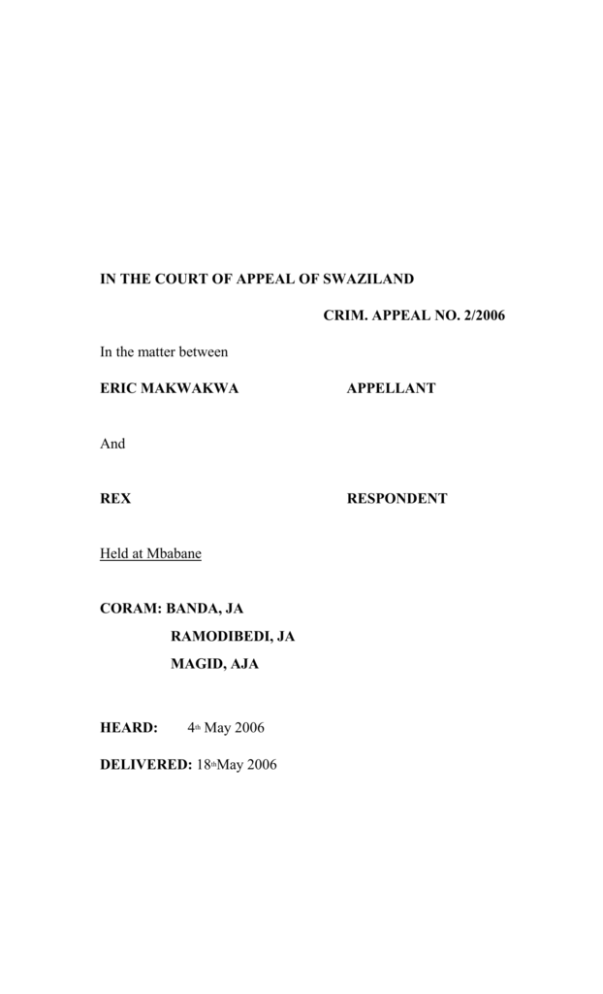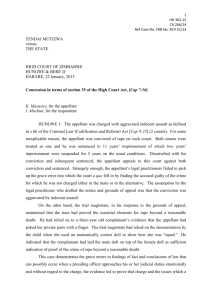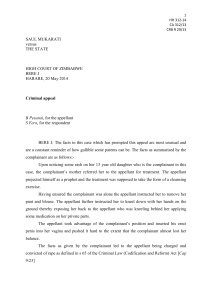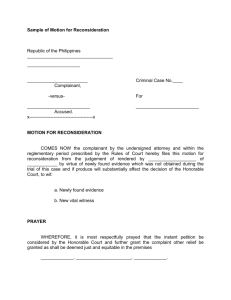SZSC_2_2006-Ano_0
advertisement

IN THE COURT OF APPEAL OF SWAZILAND CRIM. APPEAL NO. 2/2006 In the matter between ERIC MAKWAKWA APPELLANT And REX RESPONDENT Held at Mbabane CORAM: BANDA, JA RAMODIBEDI, JA MAGID, AJA HEARD: 4th May 2006 DELIVERED: 18thMay 2006 2 SUMMARY Criminal law - Rape - Evidence of young children - Whether corroboration required - Caution - Accused failing to testify -Conviction -Sentence Principles applicable thereto. JUDGMENT RAMODIBEDI, JA [1] The Appellant, a Mozambican man aged 65 years old, stood trial in the High Court on a charge of rape, it being alleged that on 13 January 2003 and at or near Mpholonjeni area, Lubombo region the Appellant intentionally had unlawful sexual intercourse with L V, a female minor aged 4 years old (hereinafter referred to as "the complainant"). It is pertinent to mention at the outset that the indictment further gave notice that the rape was attended by aggravating circumstances in the following respects:- (1) The accused being an adult male of about 65 years old stood in loco parentis relationship with the complainant who thus looked upon him to protect her. (2) The accused raped the complainant while she was discharging duties at his own instructions and thus abused society's mores that children should obey adults. 3 (3) The complainant was of a very tender age. (4) The accused failed to use protective measures before raping the complainant thus putting her to the risk of contracting venereal diseases including HIV/Aids. [2] The Appellant who was unrepresented at the trial but whose constitutional rights were fully explained to him was convicted as charged, and on 18 March 2005 he was sentenced to 12 years imprisonment backdated to 13 January 2003. On 6 April 2005, he noted an appeal on the following grounds:(1) that the evidence of the Crown witnesses was not corroborative to warrant a conviction. (2) that the sentence is too harsh in that it induces a sense of shock. [3] In outline, it is the case for the Crown that on 13 January 2003, the Appellant who was employed by the complainant's family as a herdboy cunningly lured the complainant into his room. He used a simple strategy on the unsuspecting young child. He instructed her to go and fetch vaseline for him. The complainant innocently obliged but the Appellant immediately pounced on his unsuspecting 4 victim. [4] The story at this stage is perhaps best told by the complainant herself. She says that after she had given the vaseline to the Appellant he then pulled down her "panty". Thereafter he applied the vaseline on her private parts after which he made her lie down on the bed facing upwards. He removed his pants, placed a knife next to the complainant and proceeded to have sexual intercourse with her while lying on top of her. [5] PW2, H V duly corroborated the complainant. She is the elder sister to the complainant and was aged 13 years old at the trial. She had been playing with the complainant together with N W (PW3). She became suspicious when she noticed that the complainant was not coming out of the Appellant's room. Moreover, it looked odd to the two Crown witnesses that the complainant's "flops" were lying outside the Appellant's door. PW2 then peeped through the "door handle" and saw the Appellant on top of the complainant. She thereupon opened the door and entered the house. At this stage the Appellant "jumped" away from the complainant. He was "naked 5 from the top and his trousers were in between his thighs together with his underwear". The complainant was also "naked on top and her panties were on her thighs". [6] On being confronted by PW2, the Appellant denied having done anything wrong to the complainant. However, when PW2 threatened to go and report the incident to the complainant's mother, namely V V V (PW4), the Appellant begged her not to do so and promised to give her money if she kept her silence. Both PW1 and PW2 corroborate each other on this aspect and I should add that this damning piece of evidence was never disputed by the Appellant. [7] The evidence of Dr Kambale Andakit (PW6) also provided corroboration to the complainant's allegation that the Appellant had sexual intercourse with her. Although the complainant's hymen was intact and there were no spermatozoa seen, the doctor was able to see a discharge on the complainant's vulva. His examination revealed that the complainant had contracted gonorrhoea. In the doctor's opinion, this infection was proof that the complainant had had sexual contact with another person who "gave" her gonorrhoea. The doctor was not challenged and there is no reason why his 6 evidence should not be accepted as correct. [8] It is significant to record at this stage that the Appellant did not testify in his own defence despite repeated prompting by the learned trial Judge to do so, in the circumstances of the case. The trial court took this factor into account in convicting the Appellant. [9] Now it is so that failure to testify does not always lead to a conviction. It all depends on the particular circumstances of each case. This much is certain, however. Where there is a prima facie case implicating the accused which calls for an answer, his failure to testify can properly be used as a factor against him. See such cases as S v Snyman 1968 (2) S.A. 582 (A) at 588; S v Khoza 1982 (3) S.A. 1019 (A)atl043C-D. [10] It remains for me to mention that after seeing and hearing the Crown witnesses the trial court believed them. It need hardly be stressed that an Appellate Court is generally slow to interfere with the findings of fact of a trial court which was steeped in the atmosphere of the trial and was as such in a better position to make 7 an informed assessment on credibility. In the absence of any material misdirection by the learned trial Judge, I can find no fault with his approach. After all, the Appellant's cross-examination of the Crown witnesses was most ineffectual. They remained unshaken in their evidence. [11] Moreover, it is evident from the record that the trial court duly cautioned itself on the danger of relying on the evidence of young children within the guidelines set out by this Court in such cases as Roy Ndabazabantu Mabuza v Rex - Criminal Appeal No. 35/2002 (unreported). Nor is it correct, as the Appellant seems to suggest in his first ground of appeal, that corroboration is a requirement for a conviction on a charge of rape. In this regard the following remarks of this Court in Mabuza's case supra are most instructive, namely:- "It is clear, however, that the evidence of young children should be accepted with caution. The imaginativeness and suggestibility of children are only two of a number of elements that require that this should be so. However, courts should not act upon any rigid rule that corroboration must always be present before a child's evidence is accepted (see R v Manda 1951 (3) S.A. 158 (A) at 163). The 8 question which the court should ask itself is whether the evidence of the young witness is trustworthy". See also the case of Themba Donald Dlamini v The King - Appeal Case No. 14/98 (unreported). In casu, however, it must be noted that there was sufficient corroboration as fully set out in paragraphs [5] - [7] above. Furthermore, this was a very serious rape case with aggravating features as fully set out in paragraph [1] above. To make matters worse, the Appellant showed no remorse in the circumstances of the case. [12] In the light of the foregoing, I consider that the Appellant was rightly convicted. There was a formidable body of evidence against him which in my judgment left no reasonable doubt as to his guilt. [13] Similarly, the Appellant's complaint against sentence is without any merit. This is so because sentence is preeminently a matter within the discretion of a trial court. A Court of Appeal will not generally interfere unless there is a material misdirection resulting in a miscarriage of justice. No such misdirection has been shown to exist in this case. On the contrary, it is clear from the record that the trial court properly took into account all that needed to be 9 considered in the interests of justice including the personal circumstances of the Appellant. It is right that courts should mark their abhorrence of the prevalent sexual attacks on young children as a deterrent. See for example Rex v Mfanizile Mkhwanazi - Criminal Appeal No. 6/2004 (unreported); Rex v Christopher Boy Masuku - Criminal Appeal Case No. 16/2004 (unreported). [14] It follows in my judgment that the appeal must fail. It is accordingly dismissed and both conviction and sentence are confirmed. M.M. RAMODIBEDI JUSTICE OF APPEAL I agree R.A. BANDA JUSTICE OF APPEAL I agree 10 P.A.M MAGID ACTING JUSTICE OF APPEAL For Appellant: For Respondent: IN PERSON MR. S. FAKUDZE








![[J-56A&B-2014][MO – Eakin, J.] IN THE SUPREME COURT OF](http://s3.studylib.net/store/data/008438149_1-ddd67f54580e54c004e3a347786df2e1-300x300.png)